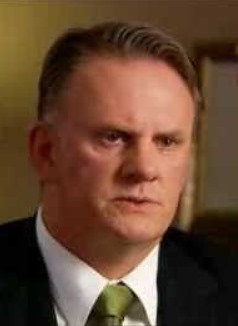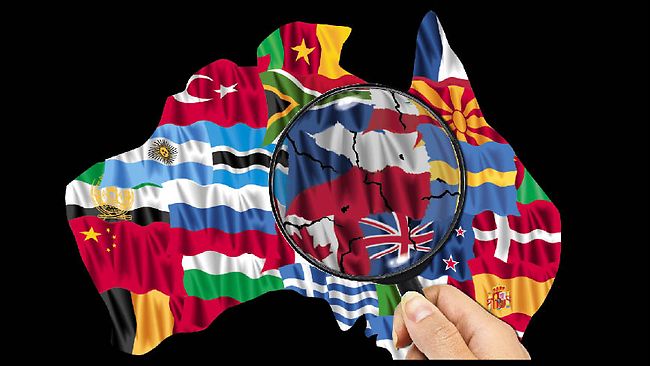The Future Belongs to Us
(if we want it to)
It is tempting for those on the traditionalist scene to think that conservatism is a spent force or that there is a crisis on the right side of the political spectrum. Certainly, there are good reasons to hold such views, but these concerns are not limited to the political right. A similar cynicism can be found among our ideological opponents, and this can be instructive. Indeed, a case could be made that the success of our opponents has become their undoing. This may seem ironic, but it contains the seeds of a traditionalist revival which may be within reach, or at the very least it may set the stage for an eventual popular reaction, and even turning the tides of the zeitgeist. Consider Tim Farron, former leader of the British Liberal Democrats, who gave a speech last month at the Theos Annual Lecture in which he observed that:

Tim Farron
Liberalism has apparently won. Even members of the Conservative and Labour parties call themselves liberals today. Let’s be honest, you can’t work in the media without being a liberal. Even most of the journalists who write for the right wing press are in truth liberals.
Despite my best efforts, the Liberal Democrats have not won. But irrespective of my efforts, Liberalism has.1
He is right that liberalism, in both its left-wing and right-wing forms, has been dominant within the political establishment for many decades, to the point that it could be described as a state ideology. But Farron is aware that liberalism is starting to fail. He believes that it has developed into “a respectable tyranny” and that “in this country and across the world, Liberalism will eat itself. Is eating itself. May already have eaten itself.”2
Farron is a liberal who nonetheless sees liberalism as lurching into crisis. So what is this crisis? For Farron the problem is that liberalism is becoming ever more intolerant as it imposes itself in a more dominant way on society. I agree with him, but there is more to it than this. There are reasons to expect that liberalism is going to continue to alienate parts of the population. So we are entering a critical phase in the history of the right. If we meet certain organisational and political challenges, there is an unprecedented opportunity to move from the political margins and to begin to exert some influence on society.
I
Leftist Modus Operandi and Identity Politics
It might help to look briefly at where liberalism is doing itself the most damage. Perhaps the most obvious is the promotion of a kind of self-hate which encourages the heirs of Western civilisation (personified by the strawman of the “White, Heterosexual, Christian, Male”) to reject their history, heritage and values. Dianna West traces this trend to the end of the Second World War where the defeat of chauvinistic totalitarianism mutated into the rejection of Western particularism itself. Hitlerite national socialism was destroyed, but:
so, too, perhaps, were all notions of Western primacy regarding culture and race (which I take here to include nationhood) – even ones that supported, not supremacy in a murderous form, but judgment in a rational form. Grounded by notions of sovereignty and cultural affinity, such judgment determines the kinds of attitudes and choices- on everything from religion to law to literature – that are expressed in cultural identity.3
Years before the popularisation of the term “cuckservative” within the online culture of the so-called “Alternative Right”, the late Lawrence Auster described this process in similar terms. West relied upon Auster’s following passage when illustrating where this self-hatred comes from:
Having defined the ultimate evil of Nazism, not as the ultimate violation of the moral law as traditionally understood, but as the violation of liberal tolerance, postwar liberalism then set about dismantling all the existing ordinary particularisms of our own society (including, in the case of the EU, nationhood itself) in the name of preventing a resurgence of Nazi-like evil.4
Unsurprisingly, right now the biggest developments are happening on the left in the United States. The American left has been emboldened by demographic changes in the United States to identify “whiteness” as a negative marker of privilege and oppression, and it is now common on social media for this to translate into overt hostility toward white Americans. Sociologist Frank Salter has documented similar trends appearing in Australia as well. His recent collection of his essays from Quadrant magazine, The War on Human Nature shows how the politics of deconstruction and critical theory have created a toxic environment in academia, and how this has translated into corrosive social policy.5 Obviously, we are not immune to these developments, but the United States, especially after the election of the populist President Donald Trump, shows just how deep this crisis can get.

Diana West
Perhaps even more significantly, left-liberalism in the United States has become a vehicle for minority races to make claims on the white majority. It is the language by which other races try to justify special claims made on white Americans. And, whereas it is not always easy to “wake people up” through the use of logical argument, most people are alert to when others try to take advantage of them. Tim Farron’s earlier point about how liberalism has eaten itself in the UK is no less relevant to the situation in the US. Illiberal coercion is now routinely needed to simply safeguard the illusion of a functioning liberal order. But that illusion is becoming harder and harder to maintain. It seems likely, therefore, that white Americans will continue to drift away from the left. Most will not want to be portrayed negatively as privileged oppressors; or react well to overt hostility in the media; or wish to be politically hustled.
But where will they go? They could potentially remain in the liberal tent, if they are swept up by some variant of right (i.e. classical) liberalism. There are certain debates, therefore, that are going to matter a great deal over the next few years. The first is the relationship between the individual and the collective. Right liberals will argue that the individual always stands against the collective; we need to make the case that individuals, being social creatures, require certain collectives (families, ethnies etc.) to fully form their identities, to express their moral natures and to fulfil their natural ends. Our task is therefore to break out of the ideological reductionism of libertarianism (which leads to social atomisation) as well as avoiding the darker aspects of identity politics on the right.
The second debate will, therefore, concern nationalism. Right liberals will argue that nations are based on a civic creed (on shared values), meaning that anyone can potentially become a member of any nation. We have to win people to the view that nations, as traditionally understood, are peoples with some combination of a shared ancestry, history, culture and language. This implicitly goes to the heart of a particularist understanding of identity based on traditional moral principles. The error that unfortunately still plagues the minds of all liberals (many conservatives) is that it is ‘immoral’ to acknowledge that a people has its own interests as a people and that it is not illegitimate for those people to advocate on their own behalf. It seems difficult for traditionalists of any type to successfully evangelise right liberals until this very basic point is made clear to them in a way that can be easily understandable.

Lawrence Auster
In a recent exchange between Canadian Prof. Jordan B Peterson and online advocates of ‘identitarianism’, Peterson took the very right-liberal position of saying that pride in one’s ancestors is irrational. However, this is a view that is not shared by many people the world over. In the West, it seems to be an attitude that dominates what is left of the mainstream conservative establishment only. The left understands the electoral importance of identity which is why it favours an atomistic subscriptive identity for whites, while celebrating the cultural particularism of everyone else. If right liberals could be convinced that they have been sold a bill of goods, they could be led to understand that what Auster refers to as the “moral law as traditionally understood” includes the celebration and promotion of their identities as a particular people. We honour and take pride in the achievements of our ancestors because without them our lives would be poorer in every imaginable way.
How do we win these debates? Fortunately, the left is pushing a divisive and hostile version of identity politics hard, which means that it is difficult to pretend that you can stand alone as a deracinated individual, as the liberal right would have it. In essence, the status quo is simply unsustainable in the long run. But right liberals do have some advantages. They are a longstanding part of the American political tradition and they have traditionally dominated the Republican Party. A similar situation exists in the UK with the Tories, and here in Australia with the Liberal-National Coalition. Perhaps a classic symptom of this right-liberal dominance is the inability to understand social policy beyond the confines of economic considerations. Take as an example a piece by Liberal MP Alex Hawke, who argued against his party’s proposal for an enhanced “Paid Parental Scheme” not because it was inherently bad policy (statist usurpations of the family do nothing but harm the integrity of the family unit) but because it was too expensive.6 We are even seeing this right-liberal dominance in the self-described ‘outsider’ parties such as UKIP and the new Australian Conservatives. Here, controversial issues are addressed in economic and fiscal terms, or by appealing to ‘individualism’ only.
But the strength and vigour with which progressive policy is being foisted on the public (one that is naturally uncomfortable with change in the first place) may create an intellectual space for traditionalists to advocate on behalf of themselves and Western society, and it may make our message increasingly appealing. The question therefore arises: how do we approach this opportunity?
II
Leadership and Opportunities for Advocacy within the Boarder Right
If we are thinking, then, about what to do practically to push things forward, one potential option is to create better platforms for those presenting our politics. We are not in a position to compete with the mainstream media, but we could potentially compete with the right liberal social media groups and aim to achieve a similar audience share. The recent Twitter purge of 18 December has put us on notice, and other social media platforms such as GAB may become the next vehicle on which our movement can seek refuge in, and from which it can promote its worldview. It’s important to remember that we’re the most vulnerable targets for establishment directed purging: their most dangerous opponent is not the one that can be easily caricaturised but one that can persuasively argue in favour of a genuine alternative to the liberal consensus.

Prof. Jordan B. Peterson
Nevertheless, we have another potential advantage in competing on the right for our politics. Our main competition is right liberalism because it acts as a distraction from the civilisational defining questions that only non-liberal political theory has the courage to address. In other words, our greatest opponent is ill-equipped to deal with the very things that have motivated us towards various forms of activism, be they explicitly political or cultural. However, the right liberal camp is no longer as solid as it once was. Yes, there are some who remain comfortable with what the nations of the Anglosphere and the West have become. But it is notable that others have drifted into the Dissident Right (or even the Alternative Right) because they too are alarmed by trends within the mainstream liberal culture and see the failed attempts to stop this by conventional conservatism.
It is typical of right liberals in the self-professing ‘outsider’ camp of populist conservatism that they oppose the stifling effect of political correctness in the media and academia. A typical example of this in Australia is former Labor Party leader Mark Latham, who now has a programme on the Rebel Media online platform. Rebel Media has been described as ‘AltLight’ for its insistence on defending Western civilisation in purely abstract ‘value’ terms, and Latham’s putative ‘reactionary’ rhetoric is still couched in the language of subscription identity.7 Even as far back as when he was the federal Opposition Leader, he expressed concerns by obvious signs of decline, such as the state of relationships between men and women and the instability of family life. But he has not shown signs of repudiating the liberalism on which modern social decay feeds; his critique is ultimately based on a call for all sides to ‘play by the rules’, where those rules are classical liberal values.
The issue for us is how we relate to those right liberals who are moving rightward. For a former Labor leader who was at one point in his political history touted as a potential Prime Minister of this country, Latham’s journey seems remarkable. Are we to assume that he is the only one? While some right liberals are stopping where you would expect them to and arguing against national pride (understood in its traditional moral sense) or pitting the individual against the collective (perhaps a throwback to the fusionist ideology of conservative libertarianism) others have gone further. They have kept moving, sometimes breaking cleanly with liberal concepts such as civic nationalism. Curiously, some of them have held fast to right liberalism as a political theory, but have fitted more traditionalist political positions into this. One example may be the social commentator Stefan Molyneaux, who comes from a right-libertarian or anarcho-capitalist background, but has also strongly come out against open borders and the attacks on white men in popular culture. But other, perhaps better examples can be found, such as the contributors to the comments section of OzConservative, who concede that it may be legitimate to impose immigration restrictions based on the no-harm principle.

Mark Latham
The practical dimension of this is that we may not be as marginalised on the right as previously thought and that there are opportunities for outreach to those moving in our direction. It will be important, though, to distinguish between those who have clearly stopped and who are at risk of holding things back, and those who have moved beyond, at least in their positions on key issues. The drift of right liberals toward us also presents a challenge of leadership. At the moment, some of the more prominent leaders of the Dissident Right are those who once saw right liberalism as their ideal, but who have decided that it can’t work any longer. It is likely that some of these leaders will lack the depth of conviction to hold the line against the left.
The left has been tenacious in the pursuit of its political aims. They believe the means justifies the ends, even if those means come across as hypocritical. Some still remember that Australia’s iconic progressive Prime Minister, Gough Whitlam, arranged for the Labor party to preference the Australian Nazi Party over the Liberals in the 1974 federal election.8 They believe that they are on the side of a progress of humanity toward its ultimate end point of perfection, in which freedom, equality and justice will reign. They accept that this might take time, but they do not like setbacks, and if they do ever lose, they just keep pushing back until they win. Let us not forget that the campaign to legislate so-called same sex marriage was relentless and took decades to come to fruition. After the successful recent survey which led to federal legislation that redefined the family in Australia, leftist demands for more ideological concessions have been immediate. Of course, none of the amendments to that legislation which guaranteed civil rights of dissenters were accepted. Theirs is a politics of conviction, in which their understanding of reality and its meaning is at stake.
Our leaders need a similar depth of conviction. It won’t be enough to believe that liberalism is a nice ideal but impractical. It won’t be enough to have ‘concerns’ about aspects of leftism. It won’t be enough to think that the right is cleverer or more culturally sophisticated than the left. What is needed is something more, something beyond the mere ‘praxis of preservation’, something that is capable of shifting the cultural tide by taking the wind out of the left’s sails. Whatever the winning strategy will be, it will depend on the specific circumstances of each case: what may work in America may be laughable in Australia; what shows signs of promise here, may be irrelevant to the England or the nations of Europe. One thing that will be common to all fronts is this: We will only ever begin to hold the line against the left, if our leaders believe that they are defending the higher goods in life, or deeper truths about the nature of man, his identity and his telos.
There needs to be a transition in the leadership of the right toward those with this depth of conviction. We can help this to happen in a practical way by fostering the next generation of leaders and by providing them with a platform to extend their influence.
III
The Next Generation of Men and Women
But who are the next generation? It is worth considering here the conditions faced by the younger generation of men. In a traditional society there is a sense that the sexes each have their own sphere to occupy, in which masculinity and femininity can be freely expressed. There has to be an understanding between the sexes for this to work well; in particular, there needs to be a certain level of loyalty, trust and mutual regard. This isn’t ‘sexism’, it’s a cultural expression of the natural differences which enrich both the lives of men and women, together. Abolishing these distinctions has led to individual dysfunction, demographic implosion and civilisational misery.

PM Gough Whitlam
Since the 1970s, the trust and symbiosis on which the relationship between men and women has flourished in the past, has been lost. Feminists have raised women to believe that men want to keep them down (‘in their place’) and they have promoted the idea that men and women are hostile classes competing for power and status. The sexual revolution has also done damage by discarding some of the cultural restraints on how men and women pursue relationships.
Men are no longer trusted to develop within their own sphere. There is a controlling attitude now toward men which has pathologised masculinity and masculine values. This no doubt also serves the purposes of the managerial state, which benefits from the dissolution of individual male authority by assuming individual responsibility, and then centralising its associated power. As the decline of male spaces continues, first with women being promoted within traditional male professions and the armed services, it concludes with the eventual feminisation of politics itself. Michael Tung wrote in an earlier Symposium of the Sydney Traditionalist Forum that:
Family concerns, though of fundamental importance, have been and always will be a feminine sphere, and it is precisely since the Hearth of Vesta has encroached upon the altars and debating chambers that these institutions have taken such a turn for the worse. There will always be decisions and sacrifices which only men can make, and are expected to. The Australian and Kiwi tradition of ‘mateship,’ encapsulating stoic ideals of solidarity, peer equality, and irreverent respect – consecrated by the Männerbund of ANZAC – springs from the same taproot as the Spartan Ὅμοιοι.9
In yet another irony that underscores the internal contradiction of modern liberalism, the biggest victims of this deconstruction of masculinity will be women themselves. As was pointed out in Quadrant in 2014, a politics that values the safety and health of its women will need to stop attacking the very cultural framework within which that safety can be guaranteed. A de facto state policy of emasculation has already achieved the exact opposite of this:
Indeed, should there be an iconic image of the dangers of the modern feminist delusion that emasculating men will somehow usher in a female-friendly utopia, it would have to be the face of “Linda”, victim of a violent pack rape in Gothenburg, whose bloody and battered visage occupied the front page of Sweden’s Expressen of March 26, 2005. […] it seems almost as if Swedish and Norwegian men have disappeared from the social environment altogether. Where is the leadership, the authority, the once uniquely masculine strength necessary to defend the most vulnerable in these oh-so progressive societies? Sadly, and as predicted, it is the first to disappear with the erasure of traditional male identity. […] The consequence of this feminisation is that inherent female vulnerability becomes the universal characteristic of society as it encounters foreign cultures that do not embrace the progressive ideas on which liberal utopian notions depend.10
The conditions are in place for a counterculture to emerge. This is especially true given the timely arrival of traditional women on social media. There are considerable numbers of women now who want to return to the way things were, in the sense of women having their own sphere and trusting men to have theirs. Some obvious examples on social media would include Ayla Stewart, who has a Twitter account under the avatar of “Wife with a Purpose”. That account has 35,000 followers, and the political commentary there is mixed with positive representations of her role as a wife and mother. Other similar accounts can be found, such as Rachel Weeping (“Motherhood isn’t a distraction from important work. It is the most important work”), “Lady Lily” (“When women live from their feminine nature, they embody qualities that inspire men to be masculine, protective, providers & cherish women”) and “TradGirl Scotland” (“In a time when women think marriage is slavery to the patriarch, it’s more important than ever to let women know marriage and children is a wonderful aspiration”). It is typical for these women to promote motherhood, family, female beauty and domestic life, with occasional forays into politics. They have rejected feminism at a deeper level, by denying that the female sphere represents oppression. They do not have the feminist attitude of rancour towards men.
There has been a debate lately about the role of women in politics. I don’t intend to consider this in detail, but it should be clear that I think it useful for women to promote a more traditional way of life on social media. If a society of spheres requires mutual trust and understanding between the sexes, then women are achieving something worthwhile in promoting the feminine side of this type of life. As for the masculine side, we could push this along by helping to organise male spaces. These could be directly political, with groups of men meeting to discuss politics or to work together politically, or they could be social or recreational. We must remember that a masculine archetype expresses itself in a particular culture, and that culture can be found in particular social spaces. Attacks on these spaces are effectively attacks on masculine culture, and therefore on men themselves. Whether the organisation of male spaces happens or not, I don’t think there’s much doubt that the re-creation of male spaces will be needed at some point in the future. This must first be done on a local level before our movement can have any hope of projecting onto the general culture. It is how men bond, how they test each other’s fitness, and how masculine virtues like courage, strength, honour and loyalty are fostered. It is also partly through male spaces that a raw form of masculinity is sustained, the kind that isn’t easily brought under control, and that is therefore both feared and admired, and is recognisably a part of our own tradition here in Australia.
IV
Conclusion
To conclude, I believe that the practical steps to be taken by traditionalist, reactionaries, counter-revolutionaries, members of the dissident right – however we want to describe ourselves – should focus on the fundamentals:
1. We must realise that an opening has become available where people who ordinarily do not identify with the leftist world view may be susceptible to our views;
2. We must build leadership structures that are predicated on something more than the kind of mainstream conservatism that has not managed to conserve much of anything in the Culture Wars;
3. We must realise, like the classical Tory, that there is a place for everything and everything should be in its place. That means that men and women need to understand that they have a specific role to play in society, and that the role of men is to provide the necessary leadership in hard times;
4. We must have the strength and courage to insist that we, as a people, have collective interests just like every other group, and this also includes the right to advocate for those interests.
5. While we must always obey the law, we must appreciate and understand that there is a higher law – we may not be of this world but we are in it, and this means that we have certain civil and civil responsibilities. If and where society and the state becomes corrupt (as it has) we must never accept the lies of that corruption, but diligently work towards restoration.
There is plenty for us to be depressed about. But we live in times of unexpected outcomes: Who would have thought five years ago that somebody like Trump could be elected, or that the UK would vote to leave Europe, or that the countries of the former Soviet Bloc would become beacons of hope in a Europe enamoured with Cultural Marxism? Obstacles and setbacks only present us with an opportunity to excel. It is up to us to show the world that we are masters of our own destiny.
![]() — Mark Richardson blogs at OzConservative, and Australian traditionalist conservative website of social and political commentary. He has been published at the Independent Australian and is the Convenor of the Melbourne Traditionalists network (Melbourne, Australia). Mark Richardson has been one of Australia’s chief representatives of traditionalist conservatism in the Anglosphere. He can be found on Twitter (@MarkRichardson2) and Gab.ai (@MelbourneTrads).
— Mark Richardson blogs at OzConservative, and Australian traditionalist conservative website of social and political commentary. He has been published at the Independent Australian and is the Convenor of the Melbourne Traditionalists network (Melbourne, Australia). Mark Richardson has been one of Australia’s chief representatives of traditionalist conservatism in the Anglosphere. He can be found on Twitter (@MarkRichardson2) and Gab.ai (@MelbourneTrads).
Endnotes:
- Tim Farron, “What Kind of Liberal Society Do We Want?”, Theos Annual Lecture (2017) <theosthinktank.co.uk> (accessed 19 December 2017) at ¶ ¶ 33, 34.
- Ibid. at ¶ 3.
- Diana West, The Death of the Grown-Up (St Martin’s Griffin, 2007) at p. 130.
- Lawrence Auster cited ibid., p. 131.
- Frank Salter, The War on Human Nature in Australia’s Political Culture: Collected Essays (Sydney: Social Technologies, 2017).
- Alex Hawke, “Time to Dump Costly Parental Leave Scheme” IPA Review Vol. 65 No. 1 (May 2013) pp. 32-35.
- For a paleoconservative discussion on the itentitarian themes in Mark Latham’s rhetoric, see for example: Luke Torrisi, “Meeting Mark Latham – A Curious Identitarianism for Australia” SydneyTrads – Weblog of the Sydney Traditionalist Forum (15 March 2017) <sydneytrads.com> (accessed 19 December 2017).
- Alan Jones, “Comment: Labor’s Hypocrisy” Transcript from Today Programme, Channel 9 (17 September 1998) published at GWB (undated) <gwb.com.au> (accessed 20 December 2017).
- Michael Tung, “Ride That Tiger; or The Party’s an Ass” SydneyTrads – Weblog of the Sydney Traditionalist Forum (17 October 2015) <sydneytrads.com> (accessed 19 December 2017) at ¶ 9.
- Edwin Dyga, “The Future of Australian Conservatism” Quadrant (online) (14 October 2014) <quadrant.org.au> (accessed 19 December 2017) at ¶ 37.
Citation Style:
This article is to be cited according to the following convention:
Mark Richardson, “The Future Belongs to Us (if we want it to)” SydneyTrads – Weblog of the Sydney Traditionalist Forum (24 December 2017) <sydneytrads.com/2017/12/24/symposium-ii-mark-richardson> (accessed [date]).






Leave a comment